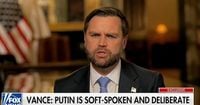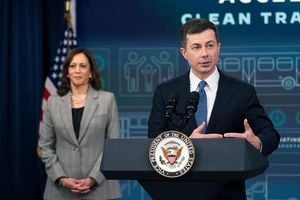Vice President JD Vance has ignited a political firestorm after describing Russian President Vladimir Putin as "soft-spoken" and "deliberate" in a series of recent interviews, sparking outrage among critics who accuse him of whitewashing the actions of a leader wanted for war crimes. The controversy erupted following Vance’s appearance on Fox News with Laura Ingraham on August 20, 2025, where he reflected on his conversations with Putin and offered a strikingly measured portrayal of the Russian president—remarks that were quickly amplified by Russian state-controlled media.
Speaking to Fox News, Vance acknowledged, “I’ve actually never met Putin. The president did that meeting. I’ve talked to him on the phone a number of times.” He continued, “He’s more soft-spoken than you would necessarily expect. You know that the American media has a particular image of him. He’s soft spoken in a certain way. He’s very deliberate; he’s very careful. And I think, fundamentally, he’s a person who looks out for the interests, as he sees it, of Russia.”
Vance’s comments came on the heels of a failed summit in Alaska between former President Donald Trump and Vladimir Putin, where the two leaders were unable to reach an agreement on a ceasefire in Ukraine. According to Vance, Trump’s approach to diplomacy was direct and unconventional. Recalling a meeting with European leaders on August 18, Vance recounted, “So we’re actually in the East Wing of the White House, and the president says, ‘You know, we’ve had a pretty good meeting. I’m going to call Vladimir Putin, see what he says about it.’ You had a lot of the Europeans who were saying, ‘No, there needs to be proper vetting and the teams have to prepare the phone call and blah, blah, blah, blah, blah. And the President was like, ‘No, no, I want to talk to the guy. I’m going to talk to the guy.’ I think that kind of no-holds-barred, no BS diplomacy is part of the reason why we’ve made the progress we have.”
Vance also asserted that Putin “respects” Trump, explaining, “While they often disagree about issues, and obviously, the president has been very critical of Vladimir Putin, the president’s also willing to work with anybody if he thinks it’s going to accomplish an important goal for America. And we all agree, an important goal is to stop the killing.”
However, Vance’s remarks were met with swift and fierce condemnation from across the political spectrum. Critics pointed to Putin’s widely documented record of human rights abuses, including the deaths of tens of thousands in Ukraine, the forced abduction of children, and the International Criminal Court’s arrest warrant for war crimes that is enforceable in 125 countries. According to BBC and other international outlets, Putin’s illegal war against Ukraine has resulted in atrocities such as rape, threats of castration of civilians and prisoners of war, and the murder of political rivals.
U.S. Representative Don Bacon (R-NE) did not mince words, stating, “Let’s not forget Putin has killed all his rivals and has made bombing Ukrainian civilians his nightly practice.” Former U.S. Ambassador to Russia Michael McFaul drew a chilling historical parallel, remarking, “He’s a killer. Stalin was soft spoken too.” Mexican journalist León Krauze echoed this sentiment, noting that Joseph Stalin, remembered by close comrades as jovial in private, was responsible for purges that cost thousands of lives. Award-winning author Jennifer Erin Valent added, “Not sure how you can come to any other conclusion than that this administration is pro murderous dictator. They literally admire Putin. It’s incredibly abhorrent.”
The Lincoln Project’s Stuart Stevens characterized Vance’s remarks as “the most subversive, fifth column statement by a Vice President in history,” suggesting they amounted to acting as an embedded sympathizer for a foreign enemy. Stevens added a personal note, questioning whether Vance would maintain his view if his own children had been abducted by Putin’s army and advertised online for adoption by Russians.
Media analysts also weighed in on the fallout. CNN national security reporter Zachary Cohen observed, “This is not really a conclusion that’s consistent with anything US intel agencies or folks who studied Putin for a long time, have articulated, as far as I’m aware.” Former GOP Congressman Joe Walsh claimed, “Today’s Republican Party is utterly compromised by Russia.”
The controversy quickly crossed international borders. Russian state-controlled outlet Russia Today (RT) seized on Vance’s comments, sharing clips of his Fox News interview on social media and framing it as a depiction of “the REAL Vladimir Putin.” Edith Olmsted, writing for The New Republic, argued, “Vice President JD Vance is so good at saying exactly what Moscow wants him to say that he’s earned a starring role in state propaganda.” She continued, “Despite what Vance has claimed, Putin isn’t a gentle altruist – he’s a dictator who hopes to acquire Ukrainian territory by force – and Vance knows that.”
Vance’s rhetoric has closely mirrored that of Donald Trump, who has been notably hesitant to outright condemn Putin’s invasion of Ukraine. While Trump has at times threatened sanctions, he has often backtracked, and his relationship with Putin has been characterized by critics as unusually cordial. According to The Daily Beast, Trump’s diplomatic style—described by Vance as “no BS”—was on display during the recent high-stakes meetings with both Ukrainian President Volodymyr Zelenskyy and Putin. Trump claimed a potential breakthrough after meeting Zelenskyy and other European leaders, where “security guarantees” were discussed, and a trilateral meeting with Putin was arranged in hopes of ending the war.
As the debate raged in Washington, the international community watched closely. Putin was set to meet with Zelenskyy soon in an effort to broker peace, following Trump’s own meetings with both leaders. The stakes could hardly be higher: Ukraine’s future and the broader stability of Europe hang in the balance, even as American political leaders spar over the tone and substance of their engagement with Moscow.
For many observers, the episode has illuminated deep divisions within U.S. politics over how to confront authoritarian regimes and defend democratic values abroad. While some see Vance’s approach as pragmatic diplomacy aimed at ending conflict, others view it as dangerously naïve or even complicit with a regime accused of grave crimes.
In the end, the uproar over Vance’s comments may be less about the volume of Putin’s voice and more about the volume of history echoing through the halls of power. As the world awaits the next chapter in the Ukraine crisis, the question of how American leaders characterize—and confront—authoritarianism abroad remains as contentious as ever.




